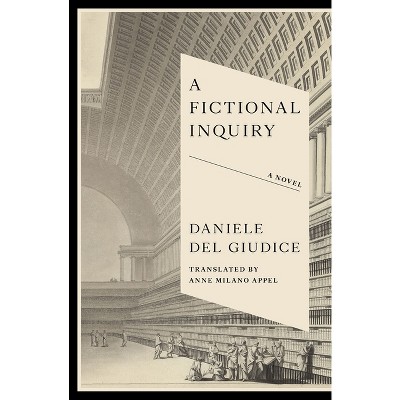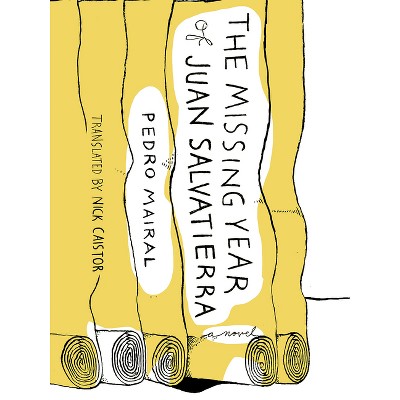Sponsored

The Lady of the Mine - by Sergei Lebedev (Paperback)
In Stock
Sponsored
About this item
Highlights
- "A monumental feat . . . a book of rare elemental power that lays bare the dark forces driving Putin's Russia today.
- About the Author: Sergei Lebedev was born in Moscow in 1981 and worked for seven years on geological expeditions in northern Russia and Central Asia.
- 240 Pages
- Fiction + Literature Genres, Literary
Description
About the Book
In 2014, Zhanna leaves college to care for her mother, Marianna, who is an expert Ukrainian laundress. Marianna, whose presence is rumored to have kept doom at bay while purifying past hidden evils, is succumbing to turmoil, disease, nd death as Russian forces encroach into Ukraine. Central to the plot is a secret mine shaft where the Nazis executed Jews, labor strikers, and prisoners.Book Synopsis
"A monumental feat . . . a book of rare elemental power that lays bare the dark forces driving Putin's Russia today."-Catherine Belton, author of Putin's People: How the KGB Took Back Russia and Then Took on the West
The mystical laundress at the center of this novel is obsessed with purity. Her task is formidable as she stands guard over a sealed shaft at a Ukrainian coal mine that hides terrible truths. The bodies of dead Jews lying in its depths seem to attract still more present-day crimes. Acclaimed Russian author Sergei Lebedev portrays a ghostly realm riven by lust and fear just as the Kremlin invades the same part of Ukraine occupied by the Wehrmacht in World War II. Then corpses rain from the sky when a jetliner is shot down overhead, scattering luxury goods along with the mortal remains. Eerie coincidences and gruesome discoveries fill this riveting exploration of an uncanny place where the geography exudes violence, and where the sins of the past are never all that in the past. Lebedev, who has won international praise for his soul-searching prose and unflinching examination of history's evils, shines light on the fault line where Nazism met Soviet communism, evolving into the new fascism of today's Russia.
Review Quotes
"Lebedev . . . shows himself a master craftsman of words and sentences, and his translator Antonina W. Bouis matches him every step of the way in English, allowing his prose, peppered with abstract nouns and lists, to have a clear, taut sound . . . He has long been compared to Solzhenitsyn, and he has continued the older writer's work of exhuming Soviet crimes."-On the Seawall
"Set in Ukraine in 2014, Sergei Lebedev's novel explores continuities of state control and suppression . . . writing both critically and imaginatively about the ongoing here and now . . . visionary in how he renders the historical horrors."--The Financial Times
"In the transfixing latest from Russian writer Lebedev, the ghosts of wars past are exhumed in 2014 eastern Ukraine . . . juxtaposes stark and horrifying present-day images, such as bodies falling from a passenger plane shot down by Russian forces, with lyrical impressions . . . It's a bleak and electrifying tour de force."--Publishers Weekly (Starred review)
"In Sergei Lebedev's harrowing novel The Lady of the Mine murdered souls buried in an abandoned Ukrainian coal mine haunt the country's emerging conflict with Russia . . . With poetic intensity and unflinching imagery . . . reveals obscured atrocities while creating hellish landscapes of the past and present."--Foreword Reviews
"A monumental feat. Lebedev mines the blackest seams of the Soviet Union's past and Russian's more recent to conjure up a book of rare elemental power that lays bare the dark forces driving Putin's Russia today. There is no braver and more important writer of his generation."--Catherine Belton, author of Putin's People: How the KGB Took Back Russia and Then Took on the West
"Lebedev's new novel is magnificent, a haunted, disturbing book. In Eastern Ukraine, an old mine holds thick sediments of human bones and souls, but there has been no reckoning, no trial of those who killed. You cannot read this cry for justice without wishing that the dead might finally speak--and that they might be heard."--Catherine Merridale, author of Lenin on the Train
"The Lady of the Mine in Antonina W. Bouis's magnificent English translation highlights Russia's efforts to sow division within the Donbas in 2014, delving into the region's legacy of atrocities via an abandoned mine shaft . . . Lebedev is a trained geologist, and his novels are full of traces of history recorded in the earth."--The Los Angeles Review of Books
"A story full of both striking beauty and unsettling violence . . . Taut with paradox and stacked with symbolism, Lebedev's novel resists surface readings . . . to explore what cannot be buried, compressed or contained in rock, and what cannot be scrubbed away by human hands,"--Jewish Book Council
"Sergei Lebedev's new novel offers his most haunting exploration yet of how guilt wreaks moral havoc across generations . . . The Lady of the Mine vividly weaves together the voices of victims and perpetrators of Soviet terror, the Holocaust, and 20th and 21st century wars. Its urgent appeal for responsibility and repentance could not be more timely."--Polly Jones, author of Gulag Fiction
"Lebedev has written a tough work of historical fiction that slowly builds toward a series of translucent revelations . . . The Lady of the Mine is an important novel that uses death and the denial of its memory to make a case for how poorly we understand the wants of the victims of fascism, forgetting that even those without life still deserve d
About the Author
Sergei Lebedev was born in Moscow in 1981 and worked for seven years on geological expeditions in northern Russia and Central Asia. Lebedev is a poet, essayist, and journalist. His novels have been translated into twenty languages and have received great acclaim in the English-speaking world. The New York Review of Books has hailed Lebedev as "the best of Russia's younger generation of writers."
Antonina W. Bouis is one of the leading translators of Russian literature working today. She has translated over eighty works from authors such as Yevgeny Yevtushenko, Mikhail Bulgakov, Andrei Sakharov, Sergei Dovlatov and Arkady and Boris Strugatsky. Bouis, previously executive director of the Soros Foundation in the former USSR, lives in New York City
Shipping details
Return details
Frequently bought together






Trending Literary Fiction











